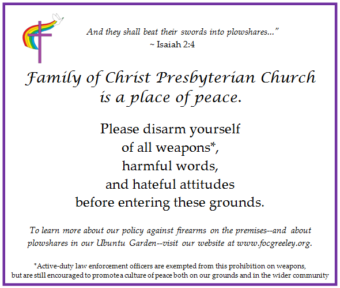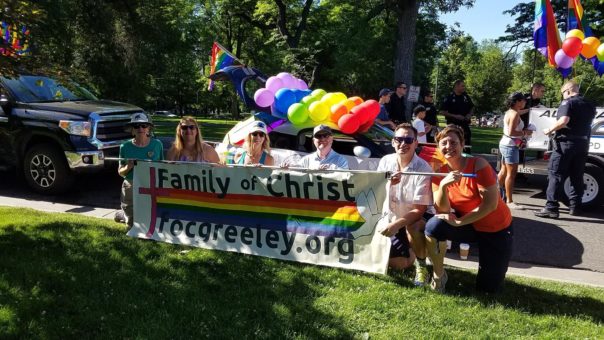
This church adheres gladly to the call of the Presbyterian Church (USA) (see last paragraph) that congregations declare their facilities and grounds gun-free areas.
We work for a peaceable city, nation and world community, for we aim to follow Jesus Christ, our Peace, whose searching discipleship question asks, What does God’s love require? A fear-driven country awash with more than 300 million guns?
We are people who choose resistance amid a pervasive gun culture. Every year some 30,000 people on American soil have their lives cut short by rapid-fire gun violence (11,000 homicides, 19,000 suicides). That’s some 80 people every day. Does not faith have something to say about safeguarding life amid pervasive death forces?
We believe that It is not necessary to debate the peculiar wording of the Second Amendment. No right is immune from reasonable regulation. This congregation advocates the common-sense gun discipline and restraint we see implicit in the Amendment.
Grieving in the wake of senseless killing is important, but even more critical is action to confront the nation’s gun-violence epidemic, defined “a public health issue” by the US Surgeon General. More: we consider gun violence a profound spiritual issue.
Questions for reflection:
- Have gun manufacturers (on behalf of gun lobbies astonishingly out of step with the public) decided that the risk of an occasional massacre is part of the cost of doing business?
- Are reasonable, relentless efforts to safeguard public safety intrinsic within the Second Amendment?
- A dangerous tide of hatred, violence and suspicion is abroad in the land. Is this tide not made more dangerous by easy access to guns and faint action for gun safety?
Actions addressing gun violence voted by the 2014 PCUSA General Assembly:
- formation of support, healing and advocacy groups for those who have experienced gun violence in their families;
- opposition to legislation that exempts gun manufacturers and marketers from legal liability and/or financial accountability for the medical and security costs of predictable gun misuse and availability to criminals, the unstable, and the self-destructive;
- opposition to “stand your ground” and other legislation that may entitle gun owners to shoot before taking alternative measures (such as relying on law enforcement and/or other de-escalation techniques) in perceived defense of persons or property;
- encouraging church sessions and PC(USA) entities that own property to declare their particular premises and gatherings to be gun-free zones;
- raising the age for handgun ownership to 21;
- supporting legislation to ban semiautomatic assault weapons, armor-piercing handgun ammunition and .50-caliber rifles; and advocacy in support of state and federal legislation to regulate ammunition.
By calling ourselves progressive Christians, we mean we are Christians who…
- Believe that following the way and teachings of Jesus can lead to experiencing sacredness, wholeness, and unity of all life, even as we recognize that the Spirit moves in beneficial ways in many faith traditions.
- Seek community that is inclusive of all people, honoring differences in theological perspective, age, race, sexual orientation, gender identity/expression, class, or ability.
- Strive for peace and justice among all people, knowing that behaving with compassion and selfless love towards one another is the fullest expression of what we believe.
- Embrace the insights of contemporary science and strive to protect the Earth and ensure its integrity and sustainability.
- Commit to a path of life-long learning, believing there is more value in questioning than in absolutes.
The first thing you should know is that being Presbyterian means that we are Christians. We don’t want the first thing we emphasize to be about how we are
different than other Christians. We want to emphasize that we are part of a family of believers bigger than just ourselves. We are all striving to follow Jesus together. We are all a part of the same team.
We believe that Jesus Christ is Lord; he lived, died, and rose again so that we could be at one with God, with each other, and with ourselves, now and forever.
That being said, there are some specific ways that we live all of that out.
The word “Presbyterian” comes from the Greek word presbuteros, which means, “elder.” A lot of times, we think of elders as being an older person. But when the Bible talks about elders, it refers to spiritual leaders chosen from among the people. Those leaders can be young, old, or right in the middle!
At its core, that’s what being Presbyterian is about. We don’t have a pope or a bishop giving orders from the top down. The pastor does not “run the show” or make all the decisions. And the congregation doesn’t vote on every single issue in the life of the church. We elect leaders, both men and women, from the congregation to provide for the life and ministry of the church. Think about how the American government works. We elect representatives to lead the people. That’s essentially how the Presbyterian Church works. We elect leaders who work together to discern God’s will for the church, the world, and our individual lives.
So being Presbyterian is, in part, about how we govern ourselves. It is also about theology.
We believe that God came into this world and revealed himself to us in the person of Jesus, so that we could know what God is like and know his will for this world and for our lives. God came to us in grace and love (not judgment), to bring healing and wholeness to a broken world. As Presbyterians, we believe that there is nothing we have to do to earn the love and favor of this God. God freely pours it out upon us, even when we feel like we don’t deserve it. God sought us out and gave his life up for us while we were still sinners. God’s love is a gift, not something we earn for ourselves by believing the right things or acting the right way.
The “motto” of the Presbyterian Church is “the church reforming, and always being reformed, according to the Word of God.” We believe that God is constantly revealing himself to us in new ways. We are constantly learning, growing, and being shaped into the people God created us to be. There is never a point in our life or faith where we have it all figured out or have all the answers. Faith is a process, a journey that lasts our whole lives. We believe that learning is important. Asking questions is important. Trying new things is important. All of this can help us grow in our relationship with God. Our understanding of God is formed and reformed over and over again as we engage God’s Word (written and enfleshed).
More than two million people call the Presbyterian Church (U.S.A.) their spiritual home. Worshiping in 10,000 Presbyterian congregations throughout the United States, they engage the communities in which they live and serve with God’s love.

